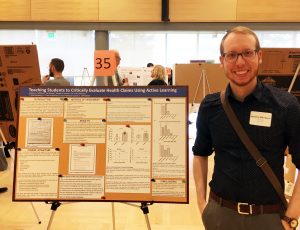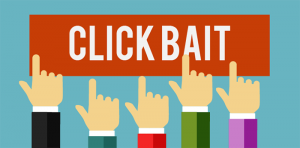by Jeremy Whitson

The Fall of 2017 was a tumultuous time for public discourse around science in the US. Phrases like “fake news” and “alternative facts” entered the mainstream vernacular as an administration that cared little for truth, accuracy, or ethics took control of the White House. Science deniers began heading key agencies, gag rules were put into place, and researchers across the country feared how their already diminishing funding might be reallocated. Meanwhile, the internet, once conceptualized as the ultimate tool for disseminating information, was proving itself to be the ultimate tool for misinformation. Long dormant diseases began making a resurgence and commercial brands were using the public’s ignorance to push misleading, or even straight up dangerous, products like raw water, anti-aging creams, and juice cleanses.
The growing anti-science rhetoric inspired my STEP co-instructors and me to create Clickbait science, sketchy supplements, and bogus advice: Critically evaluating health claims in the modern age, a course that we taught to biology majors over 5 weeks in the Summer of 2018. The class concentrated on how to critically evaluate popular health claims through a scientific lens. Our course covered how to find scientific sources, how to identify predatory journals that publish junk science, how to read a scientific paper, and the importance of statistical analyses while also having the students evaluate contemporary health claims such as “High-fructose corn syrup is worse for you than other sugars”, “Alkaline water hydrates you better than neutral pH water”, “Drinking coffee increases cancer risk”, and many more. Like other STEP classes, our goal was to teach these topics through modern active learning paradigms rather than traditional lectures. This included activities such as gallery walks, jigsaws, and think-pair-share.

Central to the class was the final group project that the students worked on over the entire length of the course. Students were split into five groups on day one, assigned a particular health claim, and tasked with writing a comprehensive review article exploring the scientific consensus around the health claim to present to the class. As part of the class’s ethos of improving public discourse, these articles were used to build a web resource on common health claims that showcases the student’s work. This web resource can be found here: https://clickbaithealthclaims.wordpress.com/
Did it work? Did students really learn how to critically evaluate health claims? Take a look at the review articles they wrote. Each article is well researched, critically reasoned, and highly informative. These are strong evidence of a positive course outcome. The students themselves primarily reported very positive experiences in their course feedback and that the active learning and group activities were especially beneficial to their learning. We also distributed surveys to students on the first and last day of class to assess how their critical thinking changed. By the end of the class students were able to clearly article what kinds of evidence are necessary to trust a health claim and how this evidence can be obtained.

Dr. Jeremy Whitson & Dr. Fan Zhang (co-teacher) presents their course results at the UW Teaching and Learning Symposium.
Combined, these subjective and objective measures show a very positive course outcome. Students clearly felt that they learned a lot and performed at a high level. So, to answer my earlier question: it worked! In this case, active learning was definitely an effective way to teach students how to critically evaluate health claims.
I hope for the opportunity to teach the same, or at least a similar, class in the future. Particularly, I’d like to teach a version of the class to non-majors, who I think could especially benefit from these lessons. Regardless, I will continue to be an advocate for scientific accuracy, critical thinking, and healthy skepticism. I also feel deeply grateful for my STEP experience, which was invaluable to my growth as an educator and will continue to influence my teaching style for many years to come.
